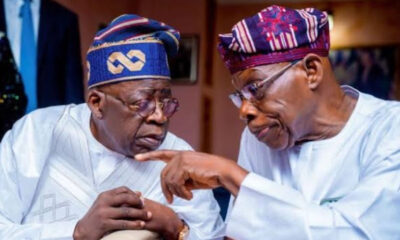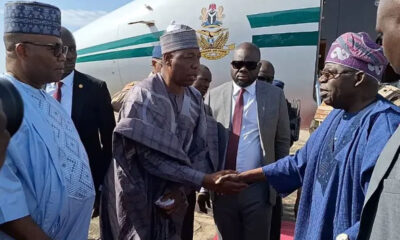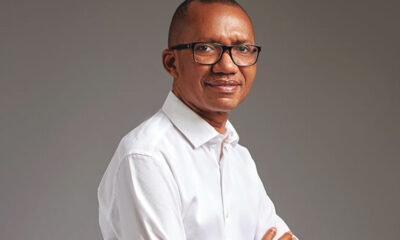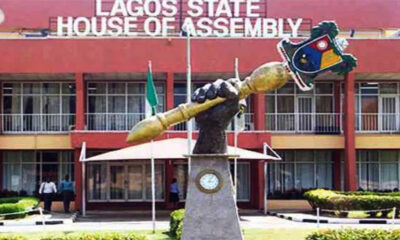Opinion
Tinubu’s June 12 fall: Humour, karma, compassion, By Farooq Kperogi

Tinubu’s June 12 fall: Humour, karma, compassion, By Farooq Kperogi
President Bola Ahmed Tinubu’s harmless trip-and-fall mishap at the Eagle Square in Abuja during this year’s June 12 Democracy Day celebration simultaneously got camps of people who exulted in emotional triumph, who laughed in self-satisfaction, who lamented the state of the president’s health, and who sulked at people who exulted, laughed, or called attention to the president’s health.
Although the president is obviously ravaged by the infirmities of old age and possibly ill health, his fall obviously wasn’t triggered by any of these. It appears to be caused by a mere missed step or a trip over his flowing agbada. Fortunately, his fall was benign. I hope his minders learn from this and let him dress more appropriately next time.
But even if his fall was prompted by ill health, it is presumptuous to make any connection between the prospects of his longevity and the state of his health. Some of the most fragile people on earth can turn out to be longest-living people.
Take, for example, former Kaduna State governor Ahmed Mohammed Makarfi, who was so infirm and so sickly during his governorship that most people thought he wouldn’t survive his first term.
He not only survived his first term, but he also won a second term, and has outlived many of the people who said he was a walking corpse. His deputy, Stephen Shekari, who looked visibly healthy, unfortunately died in 2005 during their second term.
Our compassion or ill will do absolutely nothing to shorten or lengthen people’s lifespans. And there is neither reward nor punishment for our attitude toward people’s ill fortune or good fortune in spite of what superstitious people would want you to believe.
Nature and its vagaries are inexorable. They are insensitive to and unswayed by human emotions. Coincidences, happenstances, serendipities, flukes, etc. aren’t laws of nature. They are freaks of nature.
But while it is valid to fulminate against the celebratory tone that some people took over the president’s physical misfortune, it is helpful to situate its context and understand its utility.
Vast swathes of Nigerians are being roasted alive, like never before, by the heartless, self-centered, and anti-people “economic reforms” of the president. In its June 11 report on Nigeria, even the New York Times characterized the economic crisis Nigeria is going through now as its “worst crisis in a generation.” That’s a significant admission from one of the institutional mouthpieces of the West.
READ ALSO:
- Minimum wage: New law to sanction defaulting states coming – Senate
- FG bows to pressure, reconstitutes governing boards of 111 tertiary institutions
- Customs CG for auto industry summit, stakeholders express support
Yet Tinubu and his minions insist that they won’t change course, that Nigerians must learn to live with superhuman pain for a supposed deferred gain that I am certain will never come. Plus, it’s a pain that the people inflicting it and explaining it away are totally exempt from.
Predictably, there is so much bottled, combustible rage welled up in the minds of people who are struggling to stay alive, who are almost giving up on living. Two viral videos give expression to the untamable fury that most people feel toward Tinubu, the immediate source of the mass anguish in the land.
One is a protest video of intensely enraged women in what appears to be Lagos some weeks back. Some of the women in the video said in Yoruba—and with stone-cold, deathly seriousness—that they wished they had a chance to physically meet Tinubu so that they would pummel him mercilessly for the unendurable hurt that his policies are visiting on them.
The second video, which trended a few days ago in Hausaphone social media circles, shows teenage boys in a northern Nigerian city (possibly Kano) stoning a poster of Tinubu affixed to a wall while “Labbayka Allahumma labbayk (translated in English as, “Here I am, O Allah, here I am”), a prayer invoked by pilgrims in Makkah while stoning the devil, plays in the background.
People whose staggering misery has led them to desire a physical confrontation with the president and who stone him in a symbolic eruption of rage as the representative of Satan in Nigeria would find tremendous emotional release in his fall and physical hurt. To deny them this harmless, no-cost joy is to hurt them doubly.
In psychology and literature, we talk of something called catharsis, which refers to the process of releasing and thereby providing relief from strong or repressed emotions. Catharsis serves as a crucial psychological alternative to violence by offering safe and constructive ways to process and release emotions. It is said to foster emotional well-being and reduce the risk of aggressive behavior.
In other words, for millions of Nigerians who have been pushed to the very precipice of existence as a direct consequence of Tinubu’s pigheaded implementation of IMF’s people-annihilating “economic reforms,” his fall on June 12 was cathartic, that is, emotionally satisfying.
Don’t deny them the mentally purging sensation they derive from this by guilt-tripping them as being hardhearted, especially because Tinubu wasn’t hurt.
Senator Shehu Sani has told Nigerians that Tinubu is the patron-saint and chief financier of protests in Nigeria. Now that he is president and causing the exact conditions that inspired past protests that he funded, there is no one to protest. Cathartic satisfaction from his karmic physical fall is all that severely grieving people have now.
Additionally, humor is the oxygen of democracy. As my friend Professor Moses Ochonu also pointed out in his Facebook status update a few days ago on Tinubu’s fall, comedians in the United States feast on the literal and metaphoric missteps of leaders, especially presidents, and citizens lap it up.
“In the US, where I live, late night hosts and comedians have jobs partly because the foibles, quirks, gaffes, and public physical failings and awkwardness of the president and other leaders are fair game for jokes and laughter,” he wrote.
Power confers an appearance of superhumanness, of invincibility, and of perfection on people who wield it. An occasional fall from this illusion of transcendence from familiar human weaknesses is often great grist for the humor mills.
READ ALSO:
- Increasing interest rate won’t control inflation, World Bank warns Nigeria
- Soldiers kill six bandits, recover weapons in Kaduna
- Gaza: US sanctions Israeli group for disrupting aid to civilians
President Gerald Ford is perhaps the most famous U.S. president for his falls. He slipped and fell multiple times during his presidency, including a notable fall while disembarking from Air Force One in 1975.
In 2003, President George W. Bush fell off a Segway. He also experienced a minor fall while running in 2004, which caused a scratch on his face.
Most people know that President Joe Biden has had a few notable falls, including tripping multiple times while boarding Air Force One in 2021 and falling off his bike during a ride in 2022.
The UK has also had its fair share of prime ministers who fell. For example, “Iron Lady” Margaret Thatcher had a fall in 1988 while walking at her official residence, 10 Downing Street.
In 2009, British Prime Minister Gordon Brown slipped and fell at the Cenotaph during a Remembrance Day ceremony. Another British Prime Minister, John Major, fell and injured his knee in 1995 while jogging.
And Australian Prime Minister Scott Morrison famously fell during a football game in 2019.
In all these cases, citizens laughed at the expense of their leaders. People weren’t guilt-tripped for laughing. No leader is entitled to any citizen’s unearned sympathy.
Thankfully, Tinubu appears to recognize this. He joked that he didn’t fall but merely observed the Yoruba tradition of dobale, that is, the physical gesture of prostration or kneeling as a show of respect to elders and people in positions of authority. It was good-natured, self-deprecating humor.
It reminds me of a popular humorous quote in America when people fall: “I did not trip and fall. I attacked the floor and I believe I am winning.”
Unfortunately, some people who have no capacity to appreciate the nuances of humor, irony, sarcasm, and satire missed it and thought Tinubu told a barefaced, face-saving lie in the aftermath of his embarrassing fall! That’s such clueless humorlessness.
Tinubu’s June 12 fall: Humour, karma, compassion, By Farooq Kperogi
Farooq Kperogi is a renowned Nigerian newspaper columnist and United States-based professor of journalism.
Opinion
Farooq Kperogi: World Bank’s 15-year death sentence on Nigeria

Farooq Kperogi: World Bank’s 15-year death sentence on Nigeria
The World Bank’s Senior Vice President by the name of Indermit Gill, who is originally Indian, incited mass panic in Nigeria on October 14 when he said Nigeria would need to sustain its current soul-sucking, agonizingly punishing, and self-destructive “reforms” for “at least another 10 to 15 years to transform its economy.”
Gill’s speech at the 30th Nigerian Economic Summit in Abuja—which read partly like the smug, cloying, self-congratulatory bluster President Bola Tinubu would write and partly like the intentionally obfuscating gobbledygook of dubious experts who want to conceal the truth from the uninitiated—elicited verbal and nonverbal expressions of fervent disapproval from the well-fed elites of the Nigerian Economic Summit Group and the Ministry of Budget and National Planning (who planned the event) when he said Nigeria must continue this path of national self-incineration “at least another 10 to 15 years.”
Gill was compelled to wonder aloud if the murmurs his callous exhortation triggered were a signal of disagreement or agreement from his audience. The camera zoomed in on people nodding discontentment or using their fingers to gesture disapproval. If he is smart, he would know the answer to his question.
But the soulless, blood-sucking economic vampire was unmoved. He insisted that enduring “terrible hardship across the breadth of Nigerian society” (his words) as a consequence of the gutting of petrol subsidies is the only way to “become the engine of growth in sub-Saharan Africa.” “It is very difficult to do these things,” he said, “but the rewards are massive.” What massive rewards can come out of policies that take both lives and means of livelihood?
The phrase “at least” suggests that 10 to 15 years of piecemeal national mass immolation is the irreducible minimum required to achieve prosperity. That is, 10 to 15 years is the smallest possible national self-annihilation Nigeria has to endure to “transform its economy.” Since the least possible effort can’t always guarantee success, it means it would take more than 15 years (possibly 50 years— or even eternity) to achieve prosperity through national mass annihilation.
Well, since President Tinubu can’t rule longer than seven more years (assuming he wins a second term in 2027), the World Bank has effectively prepared the perfect, ready-made alibi to explain away the irrecoverable harm its loathsome and baleful prescriptions will visit on Nigeria in the next few years.
READ ALSO:
- DSS DG risks jail for blocking Nnamdi Kanu from lawyers
- Fubara approves N85,000 minimum wage for Rivers civil servants
- Kano Hisbah arrests Jigawa commissioner with housewife in uncompleted building
Tinubu’s successor, whoever that may be, would be insane to continue with this mass obliteration of the populace they call “reforms.”
If he or she has brain cells in his or her skull and reverses this ruinous course, the World Bank would say, “Well, we told you that you needed to incinerate yourselves for at least 15 more years before you can have a chance at living. Since you brought yourselves back to life after only eight years of being in the burner, you are not sufficiently cooked, and we are not responsible for the burns and devastation that eight years of incineration brought to you. You see, you can only live if you burn yourselves alive, which you refused to do.”
This caricature might come across as grotesque and transgressive of the bounds of reasonableness, but it faithfully captures the logic of World Bank economic prescriptions for developing countries: you need to die before you can live.
If not, how could anyone celebrate the democratization of privation? “The price of [petrol] has quintupled since the subsidy cuts, imposing terrible hardships across the breadth of Nigerian society,” Gill said with a triumphant tone.
Well, one of the unspoken, unacknowledged but nonetheless far-reaching consequences of the quintupling of petrol prices is the slow but sure death of what remained of Nigeria’s education. Because of the dire existential precarity that the unaccustomed and ceaseless hikes in petrol prices have caused, many children are dropping out of school like leaves abandoning a tree before the storm hits.
A National Assembly member told me a few days ago that a prominent emir in Northwest Nigeria confided in him that he was alarmed by the sheer number of young people who are dropping out of school (at all levels of education) in his traditional sphere of authority because parents can’t afford to feed, and they consider paying the school fees of their children a burden they can’t shoulder.
This tragedy, this conscienceless assassination of the future of our youth in the service of the World Bank, isn’t limited to the North.
Two weeks ago, a close relative of mine who lives in the Southwest requested my assistance to pay the school fees of five children who were roaming the streets because they had been sent home from school for failure to pay their school fees.
Their father disappeared without a trace before he couldn’t cope. Their mother, a petty trader, manages to feed the children once in a day on a good day. But they used to get by before Tinubu’s “economic reforms” upended their lives.
We in the North are in a worse state because we are already behind the rest of the country in educational attainment. Now we are sliding even further as the sting of Tinubu’s World Bank-instigated “reforms” disrupts lives.
When a “reform” rolls back gains in school enrollment and effectively jeopardizes the future of the youth and of the country, you have to wonder why you need to implement it for at least 10 to 15 years to “grow.” It’s like pulling bricks from the foundation of a house in the name of building a taller roof. What good can possibly come out of that?
READ ALSO:
- 35 million Nigerians became poor in five years, says World Bank report
- Russia okays S’Arabia venue for potential Ukraine peace talks
- Two killed as rival cult groups clash in Akwa Ibom
What sort of “reform” contracts the economy, diminishes the productive sector, reduces the purchasing power of the people, reverses growth in education, and even kills people’s will to live?
Tinubu has repeatedly assured Nigerians that the dark tunnel of his “reforms” will produce light during his presidency and that Nigerians only have to endure a temporary penance. But the World Bank, his puppeteer, has undercut his message. It says it will take at least 10 to 15 years of maintaining these “reforms,” which extend beyond the time he is constitutionally allowed to rule, to see any benefits.
In other words, Nigerians are condemned to unmitigated anguish and deprivation for a deferred benefit that will never come since Tinubu won’t be around for the next 10 to 15 years, and his “reforms” would probably ensure that Nigerians don’t elect another neoliberal World Bank/IMF flunkey who will tout mass starvation of the citizenry as praiseworthy “reform.”
And here’s the uncomfortable truth: history offers too many cautionary tales of developing nations that have followed this very same script, only to find themselves worse off. Argentina in the early 2000s, for instance, stood on the precipice of ruin after blindly swallowing the IMF’s bitter medicine. With a wild, neoliberal, anarchist wacko of a president called Javier Milei, Argentina is back in the pit of World Bank/IMF hell.
Ecuador, too, suffered a devastating financial crisis when it adopted policies that hollowed out its middle class.
The World Bank and its cadre of international experts rarely account for the peculiarities of each nation’s economic and social dynamics. What they offer is a one-size-fits-all solution that has often wreaked havoc on the most vulnerable.
Nigeria is being told to trust this path, but development doesn’t emerge from policies that wipe out the middle class, impoverish the population, and render a nation’s currency barely worth the paper it’s printed on.
True development is rooted in fostering economic diversity, building local industry, and safeguarding the purchasing power of ordinary citizens. It’s about listening to the rhythm of the local economy and respecting its complexity, not bulldozing over it with a neoliberal agenda crafted in the halls of Washington.
No doubt, Nigeria’s economy has long needed repair. But it is one thing to call for reform and another to advocate for policies that feel like economic warfare on your own people. Tinubu may believe that this is a necessary sacrifice, but the logic of endless suffering in the name of eventual relief is deeply flawed. Countries do not develop by punishing their citizens into submission.
We must ask ourselves: how much longer can Nigeria afford to endure policies that erode its very foundation? For a nation whose citizens have weathered so many storms, the path forward must be built not on external dictates but on an understanding of Nigeria’s unique strengths and vulnerabilities. And while the World Bank preaches patience from afar, Nigerians know better than most that promises of future prosperity mean little when the present is unbearable.
A leader worth following is one who understands this. A leader who places the needs of the people above the dictates of international financial institutions. Nigeria cannot afford to pay this price much longer, and Bola Tinubu’s legacy may well rest on whether he is willing to listen to the cries of his people—or whether he will remain a distant echo of the world’s technocrats.
Farooq Kperogi: World Bank’s 15-year death sentence on Nigeria
Farooq Kperogi is a renowned newspaper columnist and United States-based Professor of Media Studies.
Opinion
Does it still make sense to trust Tinubu? by Azu Ishiekwene
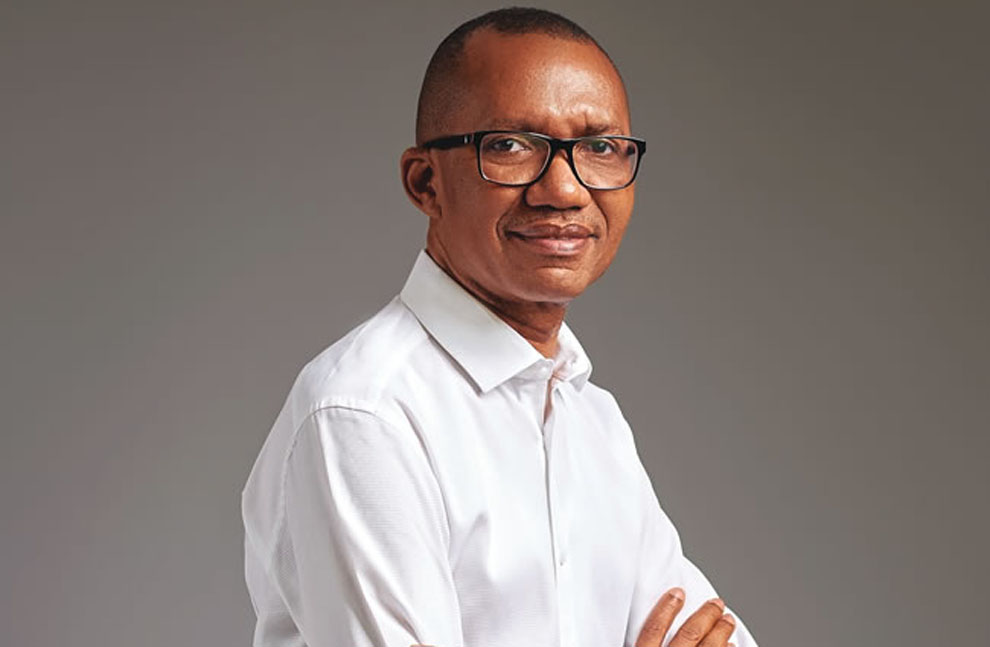
Does it still make sense to trust Tinubu? By Azu Ishiekwene
This was tough to write. My heart resisted it, but I yielded to my head. The petrol in my car, a 2.0-litre 2012 Tokunbo Camry, was at half-tank the day before writing.
When pump prices went from 195/litre to 617/litre between May and June 2023, I parked my Jeep and, despite being occasionally mistaken for an Uber driver, opted for the saloon, which, as of the third fuel price increase by September this year, cost about 65k to fill up.
After petrol pump price went up again by about 15 percent last week, it would now cost about 80k to fill up the saloon, depending on where you bought petrol from and how badly the pump was rigged.
The changes in petrol price and energy costs have affected everything else, from the price of fish to milk and the cost of bread and grains. Essential medicines are a different thing altogether. Life was hard. But it’s been a nightmare for millions more since President Bola Ahmed Tinubu’s government was inaugurated.
Generation crisis
In July, The Financial Times said the hardship under Tinubu has triggered “the worst cost of living crisis in a generation.” The newspaper gave the president credit for tackling two of the most malignant economic problems in decades – the petrol subsidy and fixed exchange rate – but said the shock therapy was so disjointed that calling it “Tinubunomics” would be a joke.
But Nigerians hardly need a foreign newspaper to render their misery in torrid colours. They know this was not the life promised. Tinubu pledged to prioritise security and jobs, tackle the mounting debt, and improve infrastructure when he took office. He came with a pro-business credential and a track record of success in Lagos that was difficult to ignore.
In the last year, however, with millions impoverished by the government’s economic policies and two major nationwide protests against hunger and bad governance, Tinubu’s reputation has taken such a severe beating that promises of light at the end of the tunnel have been brushed aside.
Turn of excuses?
His government has explained that the rot was worse than expected; that whereas previous governments since 1973 said oil money was not the problem, but how to spend it, President Muhammadu Buhari handed his successor an empty treasury, to which the response has been: yours is a continuation of the APC government, deal with it.
READ ALSO:
- JUST IN: Four police officers face trial in Imo for bribery
- Lagos Assembly to scrap 37 LCDAs created by Tinubu
- Hamas leader Yahya Sinwar feared killed in Israeli Gaza operation
Complaints about post-Covid-19 supply chain problems, long-standing structural problems, the protracted legal challenge to his election, and a hostile opposition have also been dismissed as untenable for a man who said it was his turn to govern.
Temptation
Yet, I wouldn’t write off the government, however tempting. If Tinubu’s shock therapy has been disjointed, and his economic policies severely criticised by a despairing public, the tax-and-spend remedy by The Financial Times, the West’s standard response to budget deficits – apart from the added trope about transparency and corruption – is hardly the cure in Nigeria’s case for at least two reasons.
Apart from severe loopholes, rampant poverty makes it difficult to expand the tax net or improve the yield, except if the government wishes to levy taxes on blood. Poor industrialisation, even de-industrialisation, and heavy dependence on imports, especially food imports, compound the problem and further reduce wiggle room to raise badly needed cash.
For Tinubu to dig Nigeria out of its current hole – and I believe he still can – efforts to restructure government income, including taxes, by repurposing the Federal Inland Revenue Service (FIRS) must be matched by policies that create wealth.
Options for compound problems
The government should intentionally target industrialisation and food production, with reduced foreign input. Unfortunately, widespread floods have piled on insurgency and kidnapping to reduce farm supplies and worsen food inflation.
Yet, while elites like me complain the most and the loudest, the measure of Tinubu’s success is not how much petrol I’m able to buy in my car but the impact of government policies on the rural poor, mainly farmers, who make up the bulk of the country’s 220m population.
Tinubu must work with Nigeria’s state governors, who collect security votes monthly before thinking of what to do with it to fix the security problem so that farmers can return. The country needs a system to incentivise farming, one far better managed than the Anchor-borrowers’ scheme under which the Buhari government staged occasional shows of huge grain pyramids that disappeared as soon as the events were over.
Examples from elsewhere
There would be no easy options. Examples of countries that have turned things around show that their leaders defied the norm in pivotal moments. Deng Xiaoping reversed Zedong’s isolationism by introducing market reforms and imposing a one-child policy.
READ ALSO:
- JAMB makes U-turn, directs higher institutions to admit 16-year-old candidates
- Cement company, Lafarge, to face trial over subsidiary alleged funding terrorism
- Illegal CNG conversion caused Benin car explosion – PCNGi
Lee Kuan Yew ignored Western prescriptions of democracy, even laying down markers for the foreign-owned Strait Times, limited protests, and restricted strikes and industrial actions.
Those who obsess about diversity and size would find India a good example. To the displeasure of the elite, Indira Gandhi focused on rural India. She achieved self-sufficiency in food production, reducing poverty and laying the groundwork for long-term national development.
One thing common to all three but lacking in Tinubu’s government is energy and speed of execution. For example, three months after he announced an interim measure to remove tariffs on grains and essential pharmaceuticals, the Customs have yet to get the memo – or perhaps they have, and it’s been washed up by red tape.
Sitting on the mines
Sadly, oil isn’t about to take the backstage soon. Yet, our assets, especially oil mining leases in seven blocks, including OML 111 and disputed Pan Ocean assets, have been poorly managed by NNPCL. The corporation that ought to be alarmed at divestments from the upstream and midstream is too busy piling on the government’s debt by brokering crude-for-loan deals to think of what to do with massive, fallow oil assets that it has cornered since 2009.
Experts estimate that prudent management of these assets could increase Nigeria’s production quota by between 500kbpd and 1mbpd and improve the pool of investible funds. How and why, despite his experience in the oil industry, Tinubu indulges NNPCL’s damaging and scandalous incompetence, only he can explain.
Eat that frog!
But I’m not giving up on him yet. I’m hoping he was playing politics when the political pressure group, the Patriots, led by the statesman Chief Emeka Anyaoku, visited him, and he said he needed to fix the economy before restructuring the country.
Except he prioritises that, the current system, which puts revenue sharing ahead of innovation, competition, production and reward, but instead creates a phantom of Abuja as Father Christmas, will continue to retard the country’s progress.
It’s not Tinubu’s fault that the states are yoked to Abuja. However, he cannot make any lasting changes, keep his election promises on security, jobs, the economy, or infrastructure or even inspire the states to depart their waywardness without changing how the country is governed.
He starts to lose me, not when I pay a higher petrol price but when his actions show, irretrievably, that despite his solid credentials as an advocate of restructuring, he is determined to put the cart before the horse.
Does it still make sense to trust Tinubu? By Azu Ishiekwene
Ishiekwene is Editor-In-Chief of LEADERSHIP and author of the book Writing for Media and Monetising It.
Opinion
Tinubu, Remi and Akpabio mocking Nigerians’ hardship, By Farooq Kperogi

Tinubu, Remi and Akpabio mocking Nigerians’ hardship, By Farooq Kperogi
The torment of incessantly escalating petrol prices and the consequent surge in the cost of everything have plunged Nigerians into a precipitous decline in quality of life. This dire situation is exacerbated by insensitive, almost mocking remarks from those responsible for inflicting this pain.
President Bola Ahmed Tinubu, aptly nicknamed “T-Pain,” recently stated from London that Nigerians would, in the future, appreciate the wisdom of his “reforms.” Such a statement is both callous and mendacious.
It is callous because these “reforms” are literally destroying the livelihoods of millions and causing the deaths of many. What possible benefit could the deceased derive from economic reforms that precipitated their untimely demise?
It is mendacious because, as evidenced by the history of Structural Adjustment Programs (SAP) in Nigeria—and the experiences of other nations implementing similar neoliberal economic reforms—such policies invariably erode the middle class, exacerbate poverty among the lower classes, yet please the markets, thereby benefiting the upper classes.
Almost without exception, neoliberal policies—such as the elimination of subsidies, deregulation, reductions in social spending, and fiscal austerity—exacerbate economic inequality and hinder sustainable development in developing economies. These policies often benefit large corporations and the wealthy, which creates an inequitable concentration of wealth in the hands of a few and widens the chasm between the rich and the poor.
Thus, the deferred benefits for which Tinubu wants Nigerians to endure mass deaths and hopelessness are the opening of Nigerian markets to international competition—which may please global markets but will overwhelm local businesses lacking the resources and technology to compete—and the freeing up of resources to invest in infrastructure.
However, the reality is that contemporary Nigeria is inhospitable to foreign investment due to the absence of security, social, and physical infrastructure, and because Tinubu’s policies have so impoverished the majority that they cannot afford to purchase what foreign businesses produce. This explains the mass exodus of foreign companies since 2023.
Furthermore, given the culture of endemic corruption entrenched within the upper echelons of power, most of the funds saved from subsidy withdrawals, tariff increases, intensified taxation, and cuts in social programs will likely be misappropriated. The government will still resort to borrowing from the World Bank and the IMF to finance its operations.
READ ALSO:
- NNPCL boss Mele Kyari loses daughter, Shettima sends condolences
- Libya frustrated us, one-goal victory a relief – S’Eagles Coach Eguavoen
- Chisco Transport deploys new buses, plans expansion, reward for travellers
We are already witnessing this phenomenon. Despite massive inflows of cash into government coffers, no new projects are being constructed or even initiated. In fact, governments at all levels are procrastinating over implementing the ₦70,000 per month minimum wage. State governors convert the excess funds they receive from federal allocations into dollars and stash them away, thereby putting pressure on the naira.
Now, the vast majority of Nigerians have resigned themselves to the fact that death, starvation, and hopelessness are the only certain outcomes of Tinubu’s “reforms” and are seeking a way out. Middle-class citizens are saving up to leave the country, and, for the first time ever, even the majority of northern Nigeria’s middle class is investing in plans to escape from Nigeria.
In response, Senate President Godswill Akpabio declared that Nigerians fleeing the blazing neoliberal hellhole that Tinubu has created are ungrateful and unpatriotic cowards who should be stopped. “I believe people should place love for their country above financial gains. That is why many of us choose to remain here,” he said.
Akpabio and his ilk choose to stay in Nigeria not out of love for the country but because they thrive off it and are insulated from the harm they inflict upon it. The professionals leaving Nigeria in droves are not doing so because they lack love for their country. They love their country; they simply abhor the raging neoliberal inferno it has become. It is insulting to suggest, as Akpabio did, that Nigerian emigrants are motivated by base and unpatriotic motives. Even more insulting is Akpabio’s proposed solution to halt emigration: that dissatisfied Nigerians should reduce the number of cars they own.
At times, one wonders whether Akpabio retains any functioning brain cells.
Meanwhile, Remi Tinubu, Bola Tinubu’s wife, continued this pattern of insulting Nigerians amidst their suffering. On Thursday, she told the Ooni of Ife that her husband is not responsible for Nigeria’s current travails, which contradicts her husband’s own acceptance of responsibility for the hardships Nigerians are enduring—with a promise of an illusory better tomorrow as compensation for the pain he is inflicting.
“We are just 18 months into our administration,” she said. “We are not the cause of the current situation. We are trying to fix it and secure the future.”
She then inverted logic, implying that Nigerians are suffering not because her husband has increased petrol prices more times and at higher rates than any previous president, but because prior presidents did not do what her husband is doing.
“We know that subsidy has been removed, but with God on our side, in the next two years, Nigeria will be greater than this,” she said. “Those who attempted removing subsidies before could not see it through. But with your prayers in the next two years, we will build a nation for the future.”
The rage that overcame me upon reading this is beyond description. Do these insensate individuals utilize their cognitive faculties at all?
I have long harbored a suspicion that the upper echelons of Nigeria’s power structure have been displeased with the emergence of a middle class since 1999. The markers of middle-class status—such as car and home ownership, fine dining, foreign education, and sartorial sophistication—have deprived the upper class of privileges they believed should remain exclusive to them.
In the early 2000s, they used to speak derisively of “Obasanjo drivers”—individuals who could afford to own cars due to minimum wage increase and arrears of the minimum wage during Olusegun Obasanjo’s presidency. It isn’t Obasanjo who gave people cars or created the middle class, of course. By its nature, practice of democracy creates certain jobs and circulates opportunities that foster the middle class.
Now, Tinubu’s neoliberal policies are eradicating the middle class and plunging the poor into deeper, more excruciating poverty, reminiscent of the days of military dictatorship. I wonder how much longer this can continue. Yet we will be observing from afar, as nothing that is happening now comes as a shock. I forewarned that this would occur even before Tinubu assumed power.
Tinubu, Remi and Akpabio mocking Nigerians’ hardship, By Farooq Kperogi
Farooq Kperogi is a renowned columnist and United States-based professor of journalism.
-

 News2 days ago
News2 days agoFIRS announces recruitment of young graduates
-

 metro3 days ago
metro3 days agoUpdated: Army says reports of COAS Lagbaja’s death fake news
-

 metro2 days ago
metro2 days agoOluwo chased me out when I visited him – Ooni (VIDEO)
-
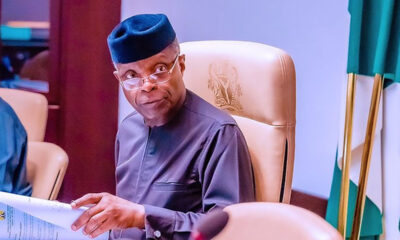
 News2 days ago
News2 days agoOsinbajo traitor, can’t talk about integrity – Reno Omokri
-
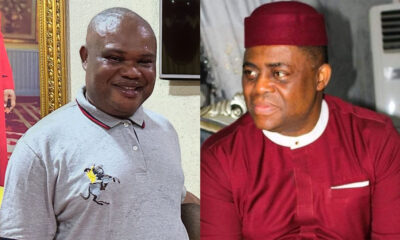
 metro2 days ago
metro2 days agoFani-Kayode: How my aide died in hotel after attending church
-

 Business1 day ago
Business1 day agoWe’re settling out of court with NNPC, others — Dangote
-

 metro2 days ago
metro2 days agoBREAKING : DSS replaces Tinubu’s chief security officer
-

 News2 days ago
News2 days agoYou can’t overrule Supreme Court on LG autonomy – Klinsmann tells Soludo



